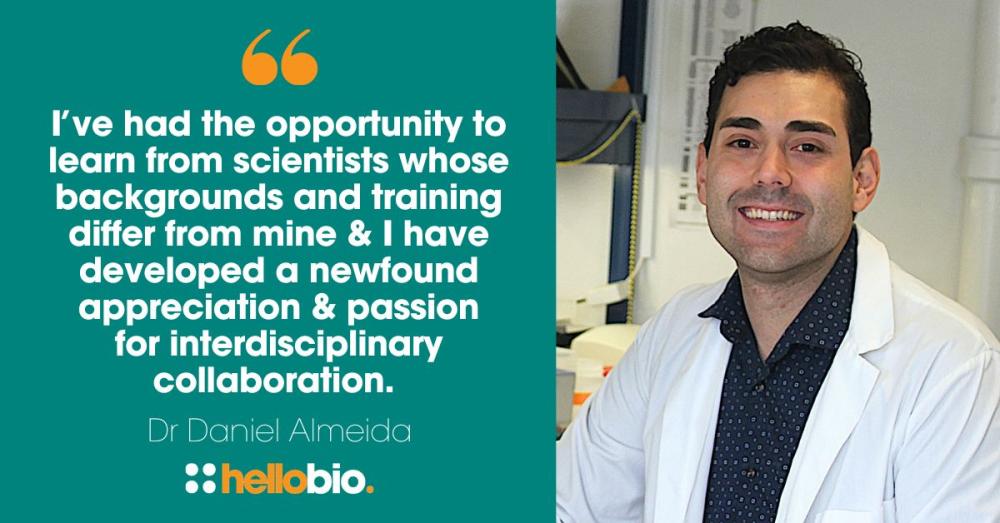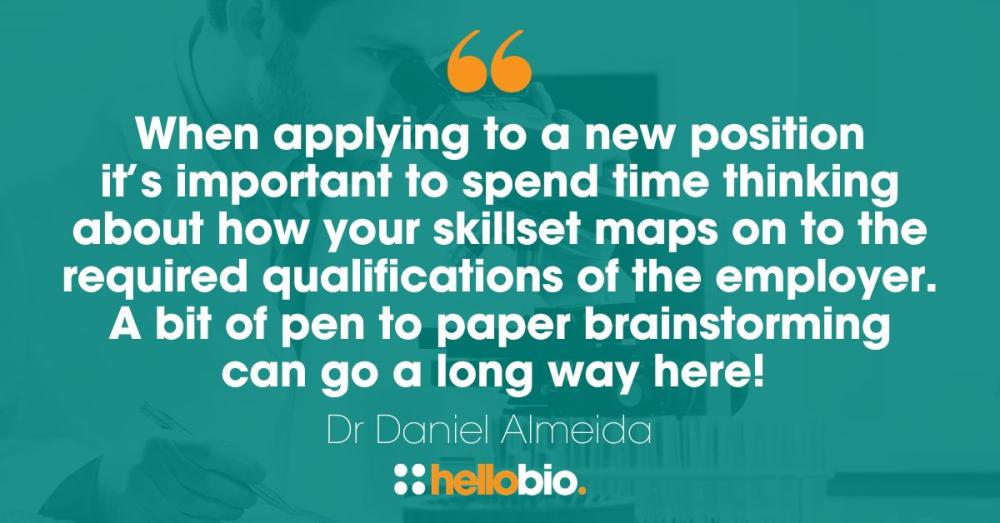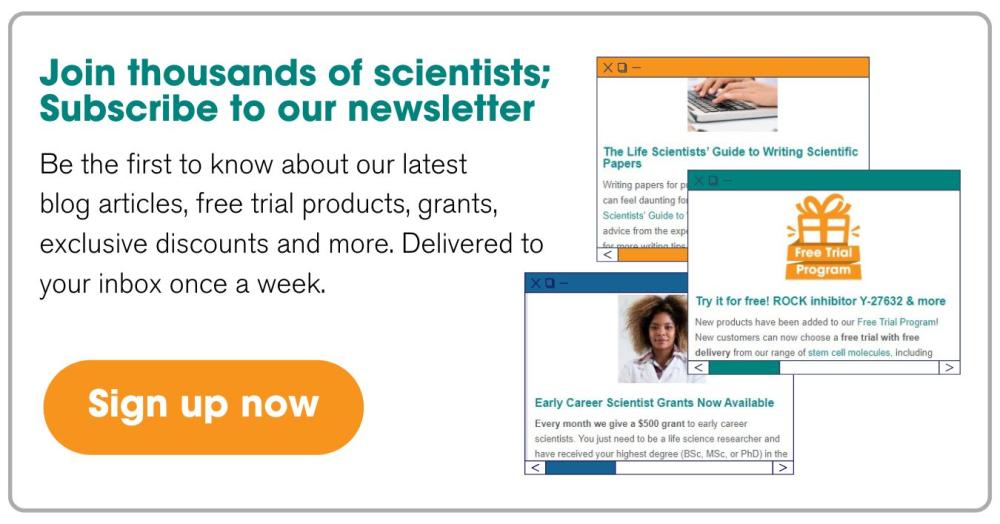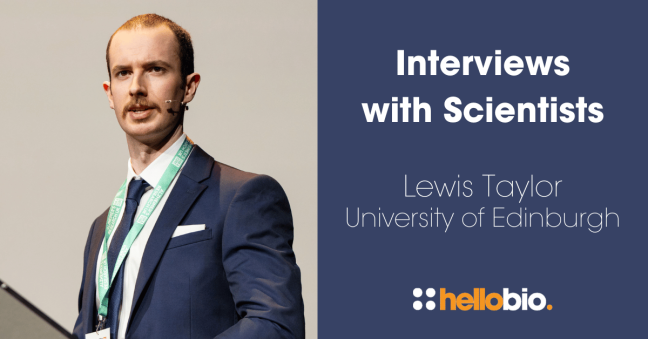Interviews with Scientists: Dr Daniel Almeida
It’s time for another installment of our Interviews with Scientists series, and we were delighted to catch up with Dr Daniel Almeida! We first interviewed Daniel 4 years ago when he was a PhD candidate at McGill University, Canada. He is now working in the field of applied behavioural science in a government context, and we were keen to find out more about his transition away from neuroscience and into his new role!
We asked Daniel to share what he enjoys most about his work, and his advice for those wishing to follow a similar career path…
Hi Daniel, great to speak to you again! Please can you tell us a little bit about your current role?
Since gaining my PhD in neuroscience at the Douglas Research Centre, I have been working in the field of applied behavioural science in a government context. My role involves applying Behavioural and Social Science methods to drive innovation in the Mental Health Promotion, Wellbeing, and Substance Use Disorders space.
What was the focus of your PhD research?
The focus of my PhD research was on utilizing post-mortem human brain samples to study the long-term impacts of severe child abuse on the brains of individuals who were depressed and died by suicide. More specifically, my research leveraged cell-type-specific sequencing technologies to characterize child abuse-associated epigenomic alterations in deep-layer pyramidal neurons of the prefrontal cortex.
Can you tell us a little bit about your transition from neuroscience to applied behavioural science?
Throughout the latter half of grad school, I began developing an interest in exploring careers outside of academia. I knew that I wanted to pursue a career where I could leverage the skills I developed throughout my academic training but wasn’t sure where to start. Reflecting on my previous years in grad school helped me realize that while I enjoyed research, there were aspects of academia that I didn’t think would work for me in the long run. Through a bit of personal research and networking, I partnered with Forbes Ignite on a project focused on exploring the intersection between neurodiversity and innovation in healthcare delivery. This opportunity introduced me to the field of applied behavioral science. Looking back at it now, while it certainly was a lot of work, I'm grateful that I remained open-minded and had the confidence to pursue diverse opportunities.
What do you enjoy most about your current work?
Like neuroscience, behavioural science is a multidisciplinary field that draws from disciplines such as psychology, behavioral economics, marketing, and decision science, among others. Because of this, I have the opportunity to work with and learn from scientists whose research backgrounds and training differ significantly from my own. I’ve been in my role for approximately a year and a half now and can say that I have developed a newfound appreciation and passion for interdisciplinary collaboration.
What are your personal career hopes for the future? Where do you see yourself in 10 years?
Over the years I've asked myself this same question time and again. As someone who loves planning and keeping my life fairly organized, one could reasonably assume that having a 10-year plan would suit me perfectly. However, in all honesty, my approach has changed quite significantly since finishing grad school. While I acknowledge the utility of having a specific plan for some individuals and at certain career stages, I've discovered that reflecting on my core values has provided me with a new outlook on my career. Through this reflection, I've realized that I’m happiest when learning new things, tackling complex challenges, and making a positive impact on others' lives. As long as I get to pursue a career aligned with these core values, I’m open to any and all opportunities.
What would you say to a grad student or postdoc who is interested in exploring careers outside of academia?
Start by reflecting on your strengths and weaknesses, as well as any gaps that might exist in your training. From there consider exploring opportunities that would allow you to begin to fill in those gaps. This stage is going to look quite different from person to person and should be guided by your own personal interests. If, for example, you really enjoy the project management aspects of your research then you might consider pursuing additional training in that space. For example, while I was exploring potential career options, I attended several workshops in science communication, stakeholder engagement and consulting. The best part was that simply being a graduate student meant that a lot of these training opportunities were freely accessible.
What advice do you have for individuals who are currently at the stage of applying for careers outside of academia?
When applying to a new position it’s incredibly important that you spend some time thinking about how your skillset maps on to the required and preferred qualifications that the employer has listed in a job ad. A bit of pen to paper brainstorming can go a long way here! From there consider perusing LinkedIn to find professionals who are already working in the space that you’re interested in breaking into. If you’re like me and enjoy networking, then setting up a few informational interviews might be in your best interest. When I did this, I was pleasantly surprised by the many professionals who offered to review my CV/resume. Keeping in mind that networking might not be something you enjoy, another option would be to see how these professionals describe their skill sets and experiences on their LinkedIn profile. What this will help you do is understand any field-specific terminology that you might want to incorporate in your CV/resume and cover letter. Once you’ve landed an interview make sure to read up on the organization so that you can strategically choose which experiences you want to ensure you’re effectively communicating to the interviewer.
_________________________________________________
Thank you for such great insights and valuable nuggets of advice Daniel!
Connect with Daniel:
- LinkedIn: Daniel Almeida, Ph.D.
- X(Twitter): Daniel Almeida
_________________________________________________
If you enjoyed this article, why not check out the other resources available on our blog. We are passionate about supporting life scientists including early career life scientists and PhD students - with really low-priced reagents, antibodies and biochemicals, early career scientist grants, and resources to help with both personal and professional development. We know how tough it is - so we hope you find these helpful!
More General Support for Life Scientists
For advice on wellbeing, dissertations, presenting at conferences, wellbeing, PhD support, networking and lots more, we have a huge range of articles to help - just click below:
Save up to 50% on our high purity reagents...
When you get to the stage of planning your experiments, don't forget that we offer a range of low-cost, high-purity agonists, antagonists, inhibitors, activators, antibodies and fluorescent tools (yes - they really are around half the price of other suppliers!) You can use our Quick Multi-Search Tool to search for lots of products in one go, and the range includes:
- Enzyme inhibitors and activators
- Chemogenetic ligands
- Ion channel modulators
- GPCR & ionotropic receptor ligands
- Cell biology reagents & biochemicals
Technical resources
Try our Molarity Calculator: a quick and easy way to calculate the mass, volume or concentration required for making a solution.
Try our Dilution Calculator: an easy way to work out how to dilute stock solutions of known concentrations
We also offer a comprehensive range of technical resources including antibody protocols and methods, product guides and mini-reviews:
And finally, don't forget to check back in with our blog regularly for our latest articles. If there’s something you’d love to contribute to the community, whether that’s an interview or article, drop us a line at hello@hellobio.com
---
























